How To Find Spy Apps On Your Phone
Your smartphone stores a great deal of personal information. Let's face it, your whole life is on that thing.
You use your cell phone on a daily basis, sending emails and text messages, making calls, listening to voicemail messages, taking and sharing videos and photos, using social media, and so much more.
What if someone was able to access all of that personal data? That could be a disaster.
But why would someone spy on you? What would they care about the information on your cell phone? There are multiple reasons why someone might want to monitor your smartphone-based activities.
Your significant other (or ex-significant other) could be wondering what you're up to when they're not around. You could have important business-related information stored on your device. If you have any money at all in your bank account or anything left on your credit limit, someone would love to steal that.
So, is someone spying on your phone? Are they using cell phone spying software? How do you tell when someone is watching you through your cell phone? What can you do about it if they are? Those are excellent questions, and they are the reason I wrote this article.
Even if you protect your smartphone with a strong password, it's still possible to be hacked. Seemingly innocent Android apps have been discovered to contain spyware, and if you've jailbroken your iPhone, someone can install spyware on your device.
In this guide, I'll tell you 10 ways to tell if someone is spying on your smartphone and what you can do to stop them.
How to Tell If Someone is Spying on Your Smartphone
Luckily, there are warning signs that you can pick up on that will alert you that there may be spyware infecting your device and monitoring your activities.
While some signs are tougher to pick up on than others, if you stay aware of how your device usually performs, you can detect if something is going on with your device.
Here are the 10 ways to tell whether or not someone is monitoring your smartphone.
1) Unusually High Data Usage
Has your monthly data usage spiked recently? Is your device using more data than normal, yet you haven't changed your online habits? That could indicate that someone has installed spyware on your device.
Lower-quality spy tools will try to send as much data about your device back to their home base (AKA the bad guys) as they possibly can. This can use large amounts of data.
On the other end of the spectrum, some of the spyware makers are quite skilled at it, and their sneaky apps are much more selective with what info they look for and send back home. This makes detection a bit tougher.
It all comes down to making sure that you stay aware of your monthly data usage and pay close attention to any sudden spikes in usage that you might see.
While you can contact your wireless carrier to check on how much data you've used, you can also check on your device. This means you can quickly check data usage without the need to search around on your provider's website or app for data usage information.
How to Check Cellular Data Usage on Android
To check your cellular data usage on an Android 9 device, do the following. (The process is the same on Android 10 and should also be similar on other versions of Android.):
- Open the Android Settings app.
- Tap "Mobile Network" (It's in the "Network & Internet" section.)
- On the Mobile Network screen, tap "App Data Usage."
- Here, you can view your current cellular app data usage. (You can select other date ranges for viewing.)
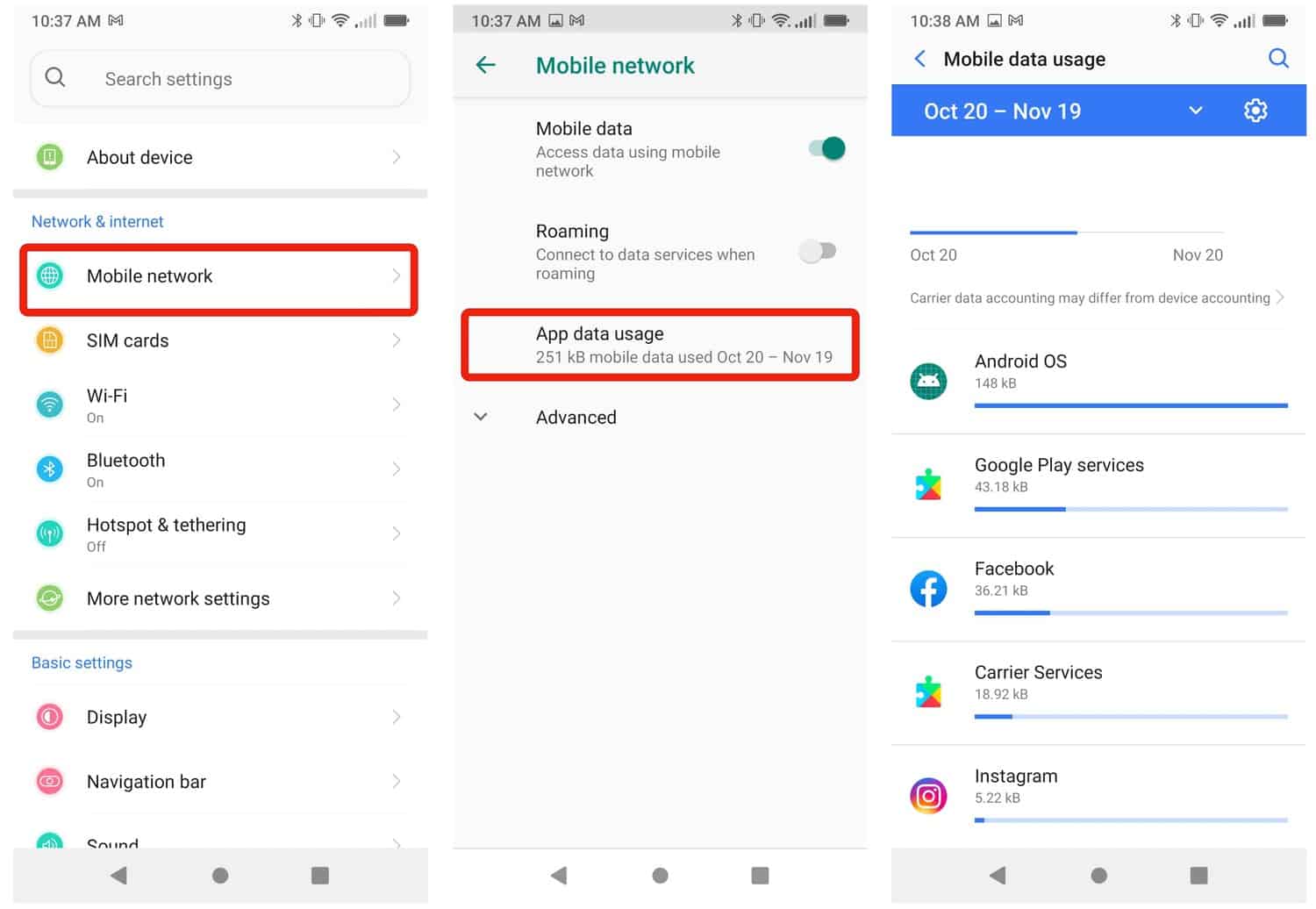
How to Check Cellular Data Usage on an iPhone
To check your cellular data usage on an iPhone running iOS 14, do the following. (The process should be similar on other versions of iOS and on iPads running iPadOS.):
- Open the iOS 14 Settings app.
- Tap the "Cellular" menu option.
- In the Cellular menu, tap the "Usage" menu option .
- On the Usage screen, you can view the data usage for the current month.
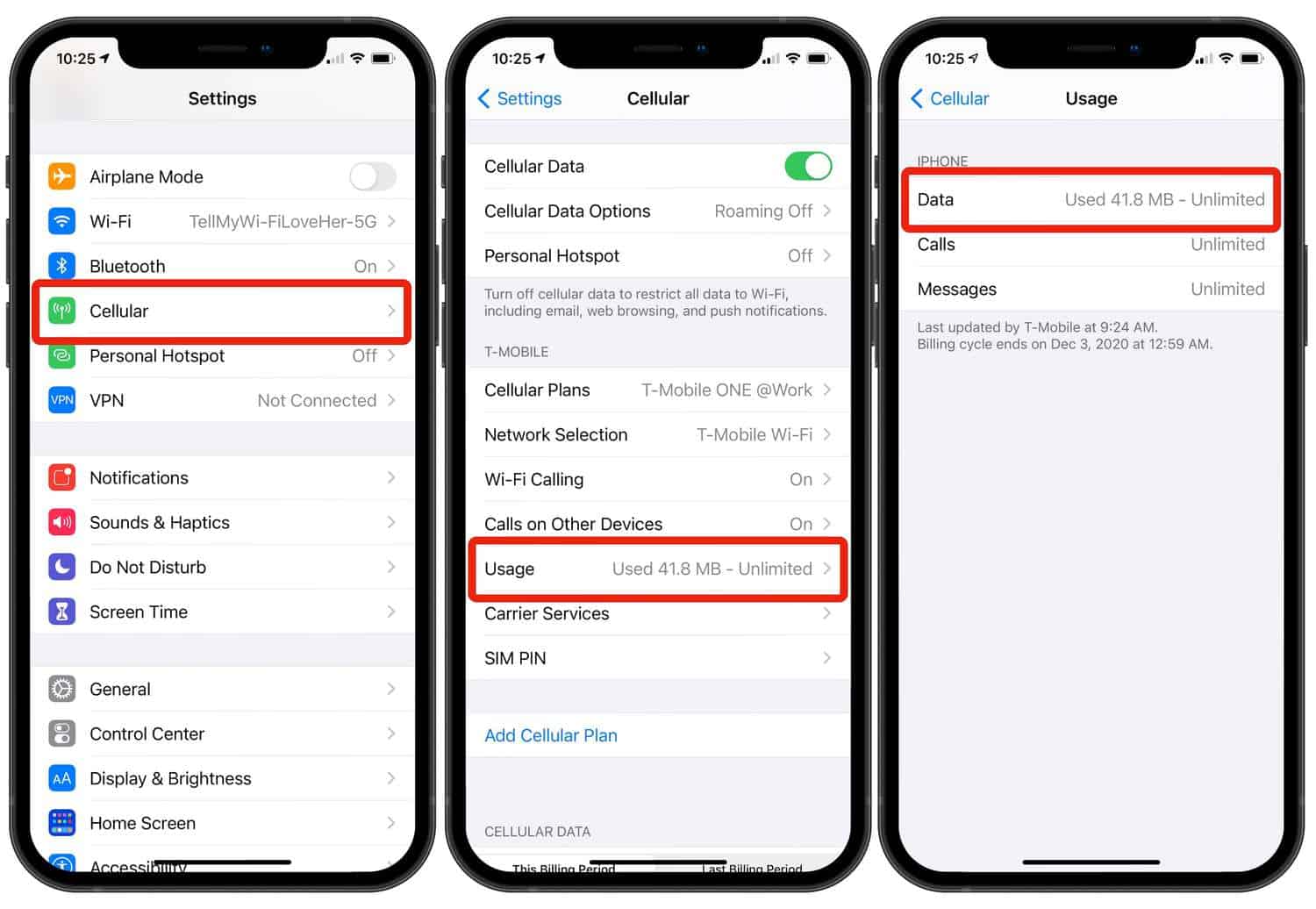
2) Cell Phone Shows Signs of Activity in Standby Mode
While you should expect your iPhone or Android phone screen to light up when you receive an incoming call, message, or most other types of notifications, your smartphone's screen shouldn't be lighting up for no reason while it's in standby mode .
If you see your device's screen light up, hear unexpected noises or sounds, and then you don't see any new notifications on the screen, something could be up.
3) Unexpected Reboots
Is your smartphone rebooting for no obvious reason or without your manually rebooting it? Someone may have unauthorized remote access to your smartphone.
Unexpected reboots may indicate someone has remote admin access and can reboot your device at will. This would also indicate they have all sorts of other access to your device and the personal data stored on it.
Or, it could mean the latest app or operating system you recently downloaded has a bug in it. Check for new updates for the OS or app. See if you can duplicate the device reboot by using the app that was open when it happened.
On your Android device, you can install and run antivirus or anti-malware security software to scan your device. iOS users will find that antivirus scanners are not available, and in the sandboxed iOS operating system, it's more likely that there is a bug in an app or in the OS that is causing the reboots.
4) Odd Sounds During Calls
In the days of analog cell phone networks, weird noises in the background and unstable connections were to be expected. However, today's all-digital cell networks usually provide connections that are stable and mostly noise-free.
So, if you are hearing weird noises in the background , or (even worse) hear a voice that doesn't belong to the person you called, there is a possibility that someone is monitoring or recording your conversation.
5) Unexpected Text Messages
Have you either received unexpected messages with weird characters in them or have your friends or other parties reported receiving weird or offensive messages from your phone?
This can be a sign that you have spyware or malware installed on your smartphone. SMS worms spread themselves through the online world by sending text messages with links embedded in them. If the victim taps the link, the worm can infect their smartphone.
On your Android device, you can install and run security software such as antivirus or anti-malware to scan your device. iOS users will likely not have to worry about these types of worms, as they target Android devices for the most part.
6) Deteriorating Battery Life
If you see your device's battery life begin deteriorating rapidly and unexpectedly, that could mean your battery is old and in need of replacement. Or, it could mean that your device is infected with spyware, and the additional load it's putting on your smartphone is draining the battery quicker than usual.
Spyware monitors all of your on-device activities and sends information about these activities back to the bad actors that infected your device. Shortened battery life often goes hand-in-hand with increased data usage due to the activities of the spyware .
Taking screenshots, copying and pasting text, recording your conversations, and possibly taking photos or recording video can eat up battery life at an alarming rate. This is especially obvious when your smartphone is supposedly idle.
If you're not sure whether it's just an old battery or actual spy software, test this by trying a different set of batteries or trying your device's battery in a different device. Then, monitor the battery usage.
Sorry iPhone users, your device's batteries are not removable. But, you can make a Genius Bar appointment and they can check your battery for you. iOS 14 users can take advantage of a new privacy feature that alerts you when an app on your device is using its camera or microphone.
If an app is using your iPhone's camera, you'll see an indicator light up at the top of your device's screen, as shown here:

If an app is using your iPhone's built-in microphone, you'll see an indicator light up at the top of your device's screen, as shown here:

While it is perfectly normal to see either of these indicators light up when apps are using either the camera or the mic, seeing them light up when you're not actively recording video or audio should serve as a warning sign that something might be up.
Determining Which Apps Have Access to Your Device's Microphone or Camera
It's easy to check your device to find out which apps currently have access to your device's microphone or camera.
On the iPhone, do the following:
-
- Open the Settings app.
- Tap "Privacy" in the Settings app.
- Tap either "Microphone" or "Camera" in the privacy menu.
- On the next page, you can view which apps have access to the selected feature. You can also toggle the access on or off in this menu.

On an Android (9) Device, do the following:
-
- Go to the Settings app.
- Tap "Apps & notifications."
- Tap "App permissions."
- Tap "Camera" or "Microphone."
- Here, you can view which apps have access to the selected feature. You can also toggle the access on or off in this menu.

7) Increasing Battery Temperature in Idle Mode
While increased battery temperature can be a sign of multiple technical issues, it can also indicate that unauthorized activities, like spyware activities, are occurring in the background.
If you haven't used your smartphone recently, and it's just been sitting idle on your desk, it shouldn't be warm or hot to the touch. If it is overly warm, then spyware could be working behind the scenes , collecting information, and sending it back to the bad actors' home base.
8) Increased Device Shut Down Time
Your smartphone, much like a Mac or Windows PC, attempts to shut down all active processes before turning itself off or when it is rebooted.
And, much like your computer, occasionally those processes can hang up and either prevent or greatly slow the shutdown process. While this can happen to any device, you may notice that it is happening more often than usual if your device has been infected with spyware .
You may notice that your smartphone takes longer than usual to shut down right after you've finished an active period with your mobile phone. This could mean the spyware is working in the background, saving its ill-gotten information and sending it back to home base.
9) Difficulty in Shutting Down or Rebooting Your Device
In addition to slowing the shutdown process of your smartphone, spyware can also prevent your device from shutting down or rebooting completely .
Again, this can be caused by a harmless app misbehaving, but if it just started happening recently, or is happening more often than not, your device might be infected with spyware. (Did anyone else hear Jeff Foxworthy say that last sentence in their head? Just me? Okay.)
10) Your Cell Phone is Growing Increasingly Slower
High-end smartphones made in the last five years or so should run fast and not show many performance issues during day-to-day use. If you notice your smartphone is lagging , performing much worse than usual, or is suddenly running out of resources like memory or storage space, it might be infected with spyware.
This is tougher to tell with older smartphones or low-priced budget handsets like you get off the rack at Walgreens. But, if you pay attention to how your smartphone usually performs, you can usually tell if something is going on.
How to Find and Remove Spy Software on Your Smartphone
As mentioned above, there is no lack of spying apps available for smartphones. A few popular examples are:
- Spyera
- TheOneSpy
- FlexiSPY
- mSpy
- Highster Mobile
All the spyware listed above can monitor and record text messages and phone conversations.
With these monitoring apps, a bad guy can take control of your mobile phone's microphone and listen to everything that happens in your immediate surroundings or even record your phone calls.
Furthermore, the more advanced applications can even steal your passwords, use your camera to physically spy on you, or even lock your cell phone completely so you can't use it anymore.
So, is there a way to find out whether spyware is installed on your device? If so, how can you remove it? Here's how.
1) Solution for Android 9 Devices
The following instructions are for Android 9 devices. Your cell phone or mobile device may be running a different version of Android. However, the process should be similar on many versions of Android. Android device vendors can also make changes to settings menus, so your layout may look different.
- Go to Settings.
- Find "Apps & notifications."
- Click on "See all apps," "All apps," or something similar – On that screen, you will find a list of installed apps. Once you're on that screen, look for app names that include terms like "spy," "monitor," "stealth," "track" or "trojan."
- If found, look up the name of the app on the internet. If it turns out that the app is suspicious, delete it.
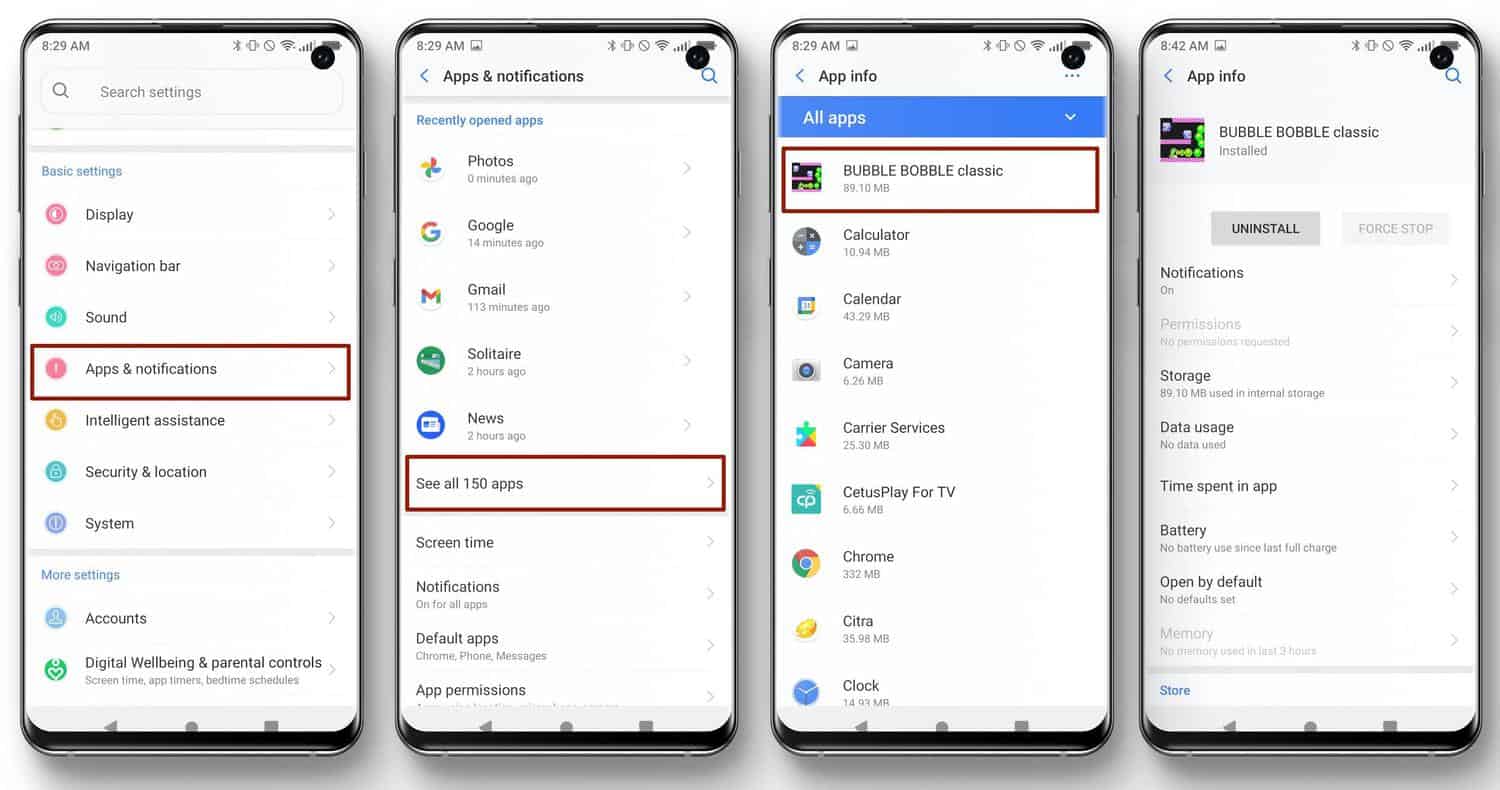
However, keep in mind that many spy apps do not use the actual name of the monitoring tool, but instead use a fake name to hide it. You should delete any unknown apps on your device.
If you're suspicious, I recommend visiting your cellular provider's nearest store or go to an electronics store, like Best Buy. Their tech team, known as the "Geek Squad," can help you delete any file that belongs to spy software.
In addition, you can also use the Google Play Store "Google Play Protect" feature to scan your installed apps for any harmful behavior. It won't detect all spy apps, but it's another weapon to battle the nosy apps. Do the following:
-
- Go to the Settings app.
- Tap "Security & location."
- Tap "Google Play Protect."
- Tap the "Scan" button.
Your apps will be scanned for any suspicious behavior.

2) Solutions for iOS Users
Apple's iOS and iPadOS operating systems are locked down, preventing apps from being installed from outside of the App Store.
It's true that you can jailbreak an iOS device, which allows installing apps from other sources. However, jailbreaking requires physical access to your mobile device, making it tougher for a bad guy (or a nosy spouse) to install spyware on the device.
While this will prevent the installation of some of the nastiest spyware available out there, Apple does allow some apps in their App Store that can be used as spyware.
These apps are usually marketed to parents for monitoring their kids' usage, GPS location, and online activities. Unfortunately, a suspicious partner, employer, or other nosy individuals can also use them to track your usage. But, keep in mind that they would need access to your mobile device and would need to know your device passcode and iCloud password.
mSpy is one of the apps available in the App Store for tracking purposes, and if you read the reviews of this app and similar apps, many of the reviews are from users looking to catch a cheating spouse. (After all, if you simply want to keep tabs on your kids' GPS location, Apple includes their "Find My" service that does just that as a built-in service in iOS.)
If you're afraid that someone has installed spyware on your iOS device, changing your iCloud password will in most cases stop the app's monitoring. For tips on creating a strong password, visit my blog post .
You can also search for and delete the app from your mobile device by entering the App Store app and searching for "spy" or a similar search term.
If an app shows "OPEN" in the list, that means the app is installed on your device. Find the app icon on your device's Home screen, then tap and hold on the icon until a pop-up menu appears. Tap on "Remove App" from the pop-up menu. Bye-bye spy app.
Admittedly, there have been reports of security and privacy vulnerabilities that were discovered in iOS in the past, allowing access by certain strains of spyware and malware.
Although these vulnerabilities have been fixed by now, there are always new threats popping up from time to time. Luckily, Apple does a decent job of keeping these bugs squashed with iOS updates, so be sure to keep your iPhone or iPad updated. (Go to the Settings app, tap "General," then tap "Software Update" to check for available updates.)
If your iPhone or iPad has been out of your sight for an extended period of time, you can simply update your device by following the steps in the previous paragraph.
You can also update iOS by connecting your iOS device to your Windows PC or Mac and update the operating system via iTunes (or via Finder on macOS Catalina or higher). This should remove any jailbreak while disabling any spy app requiring a jailbroken device.
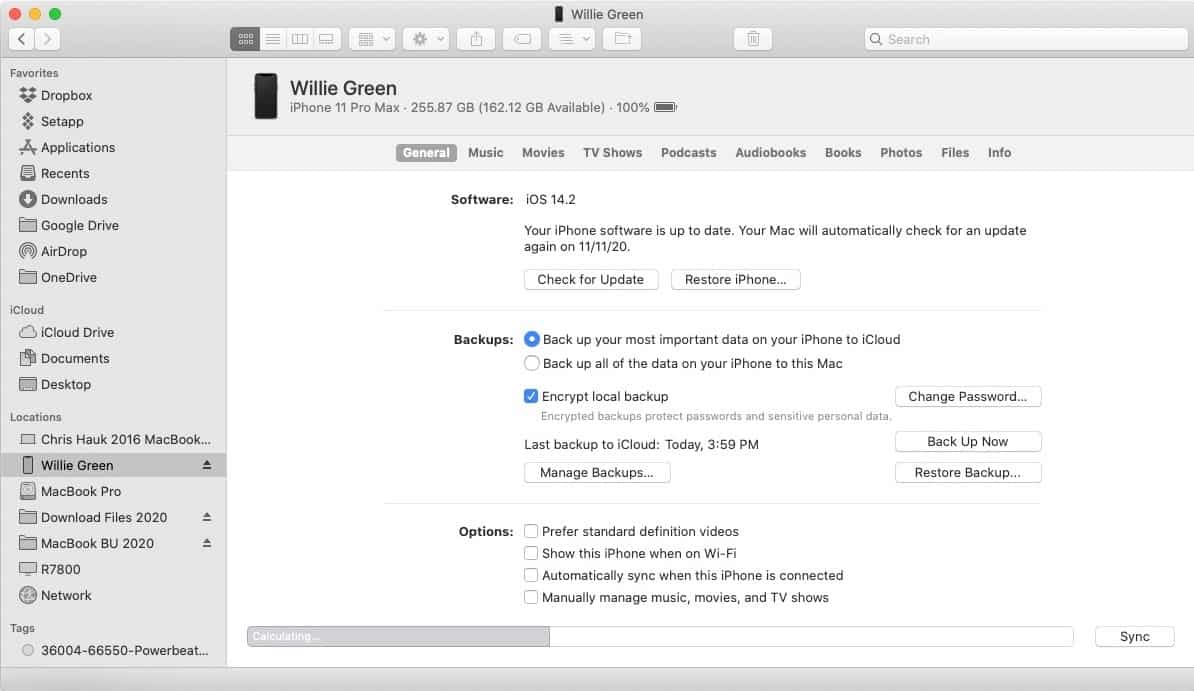
Pro tip: You can also manually backup and restore your iPhone using iTunes in Windows or macOS (or in Finder if you're using macOS Catalina or later).
3) Solution for Windows Phone Users
I'm just kidding, there isn't a solution. That's because there really isn't any true spyware available for the Windows Phone platform . (At least not that I could find.)
This is likely due to the lack of success of the Windows Phone platform, meaning there isn't much of a financial incentive to write spyware for the Windows Phone platform. (If you do know of any spyware on this platform, please let me know in the comments below.)
4) Your Last Resort: Do a Factory Reset
A factory reset is a last-resort option for both Android and iOS cell phones. Resetting your cell phone to its factory settings will delete all third-party apps – which means any spy software will be removed as well.
If you elect to do this, I strongly recommend creating a backup of your contacts, photos, and other important files you don't want to lose. Trust me, you will miss them once they're gone.
Factory Reset Process for Android Users
Again, this process may vary on your Android device. Check with your mobile device's manufacturer for more information.
-
- Go to Settings.
- Tap "System."
- Tap "Reset options."
- Tap "Erase all data (factory reset)."
- Tap "RESET PHONE."
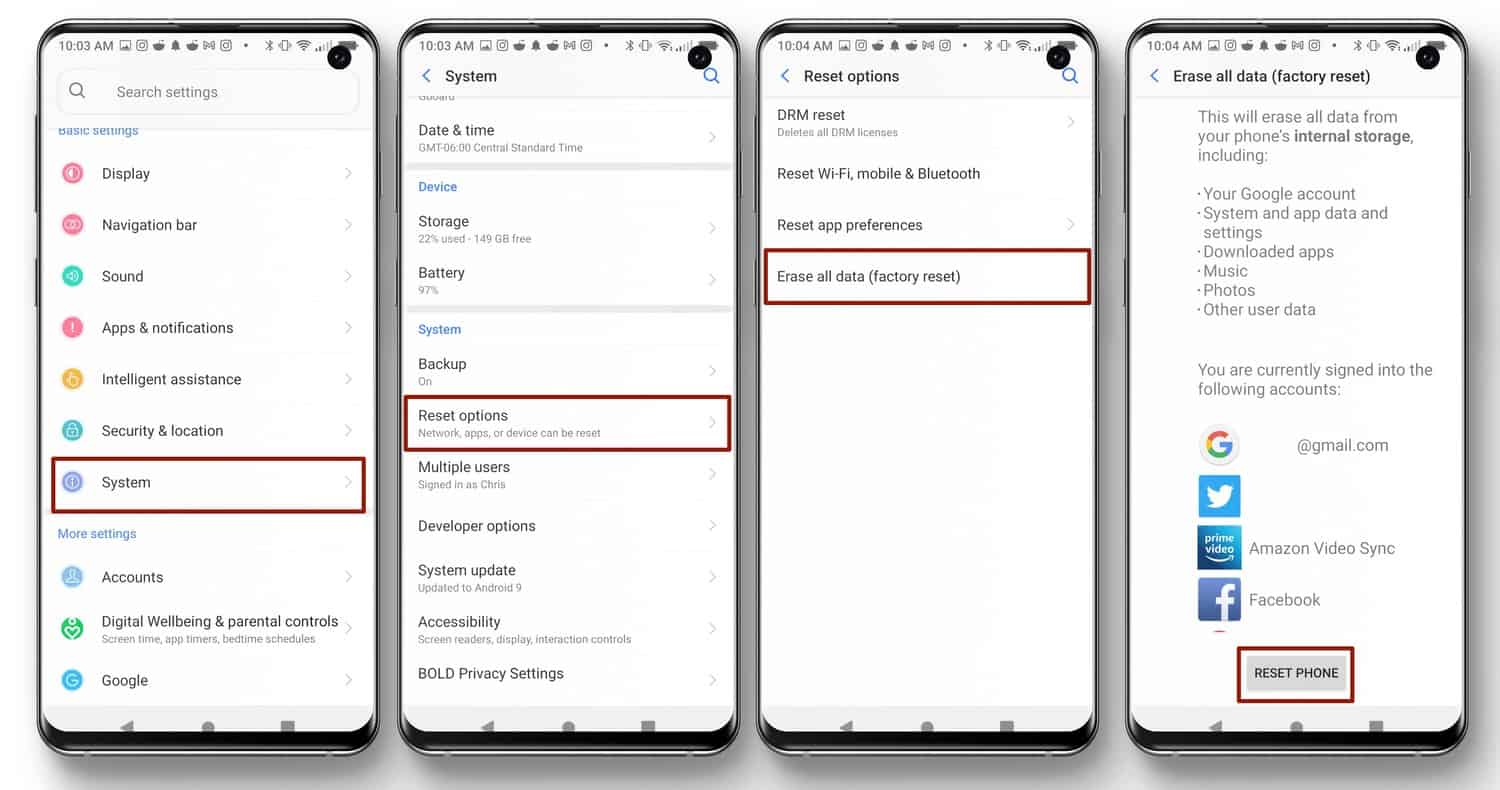
After resetting your cell phone to its factory settings, I suggest that you download and install an app called AppNotifier that will notify you whenever a new application is installed on your mobile phone. Once the app is installed, whenever someone installs something on your phone on the sly, you should receive a heads-up about it.
Factory Reset for iPhone Users
- Go to Settings.
- Find "General."
- Find "Reset."
- Click on "Reset All Settings."
- Enter your device passcode.
- You'll be warned one last time that you'll be resetting all settings and that your Apple Pay cards will be removed. Tap "Reset All Settings."
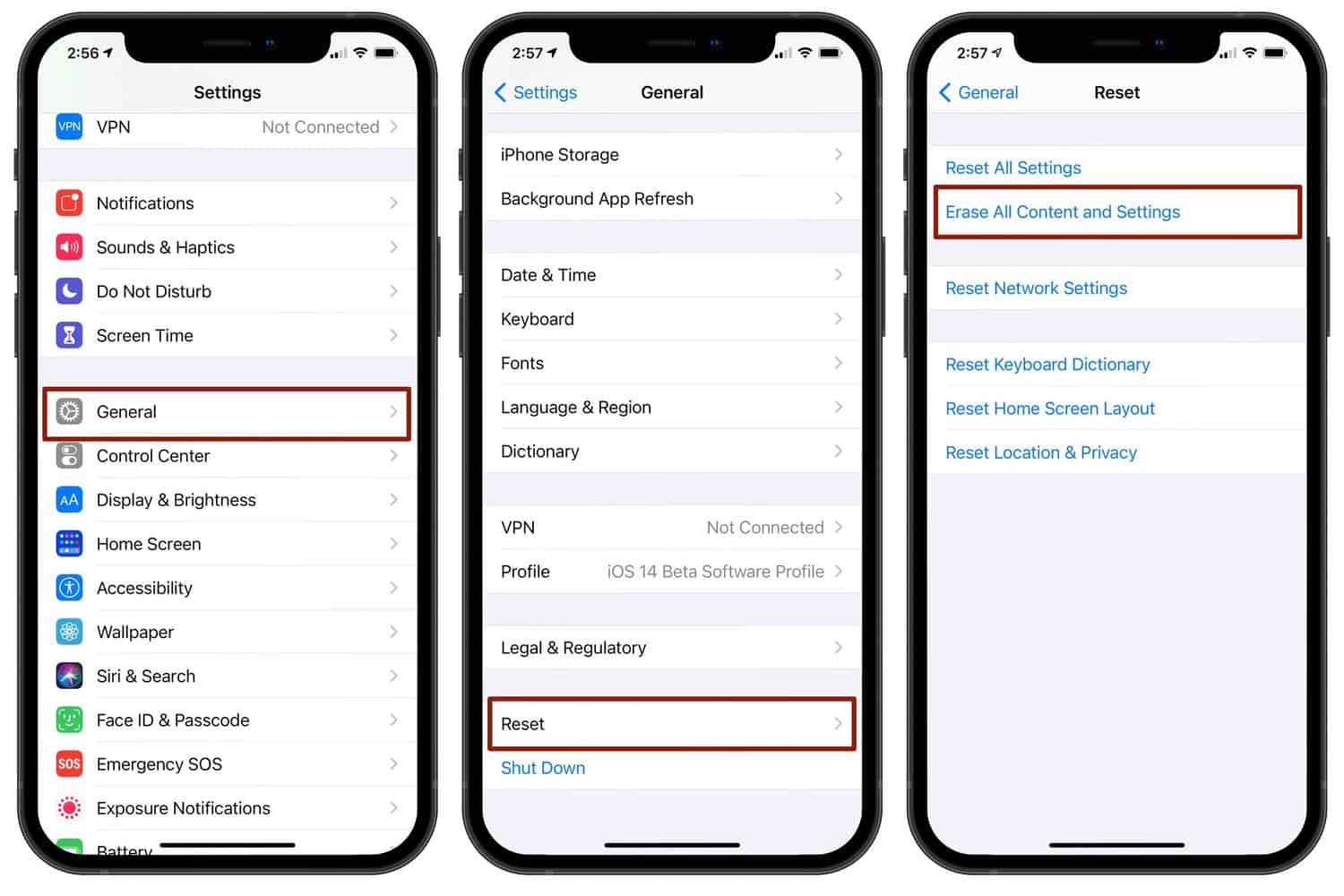
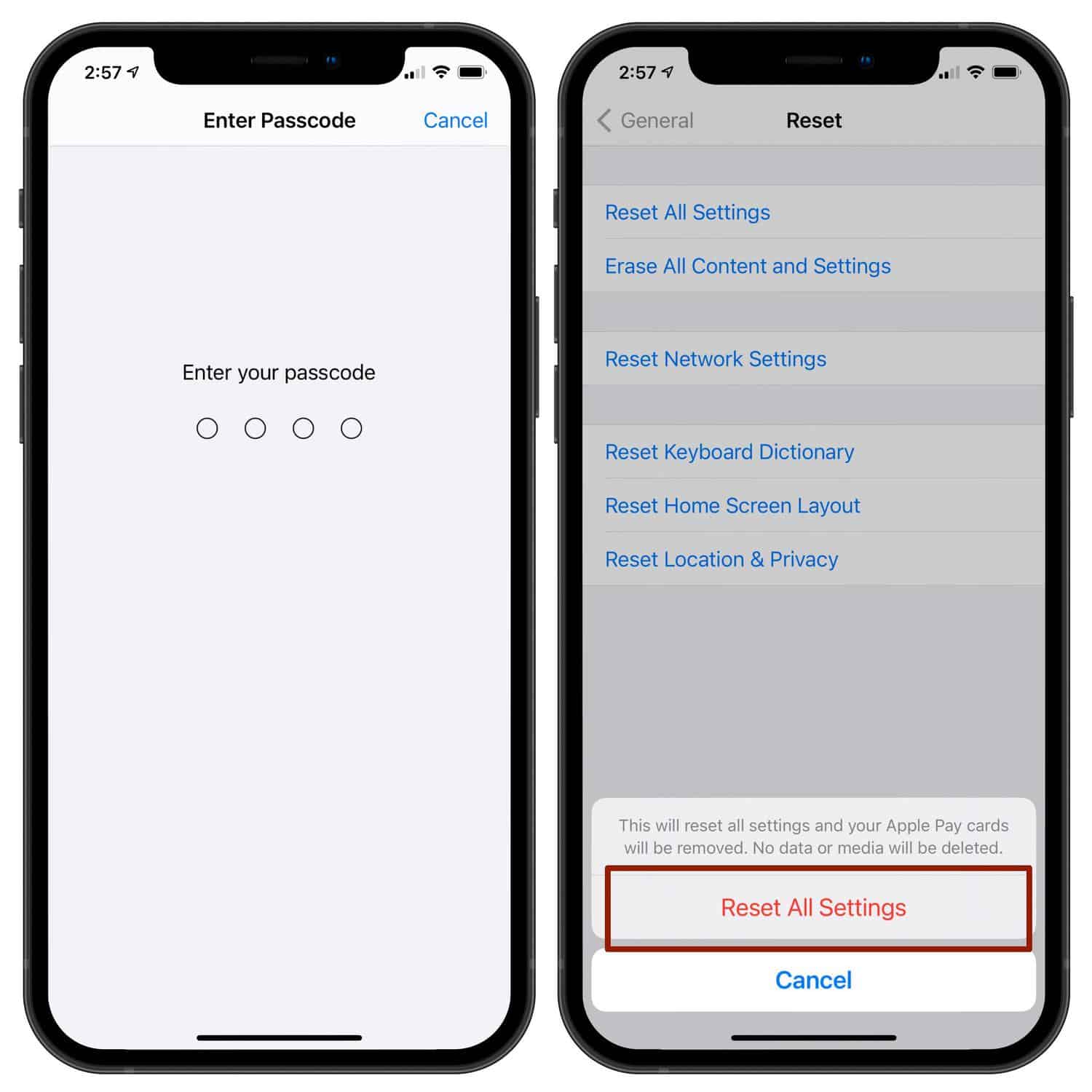
Another way to reset your iPhone back to the factory settings is via iTunes.
-
- Connect your iPhone to your computer.
- Open iTunes (or Finder on macOS Catalina or later).
- Click on "Restore iPhone."
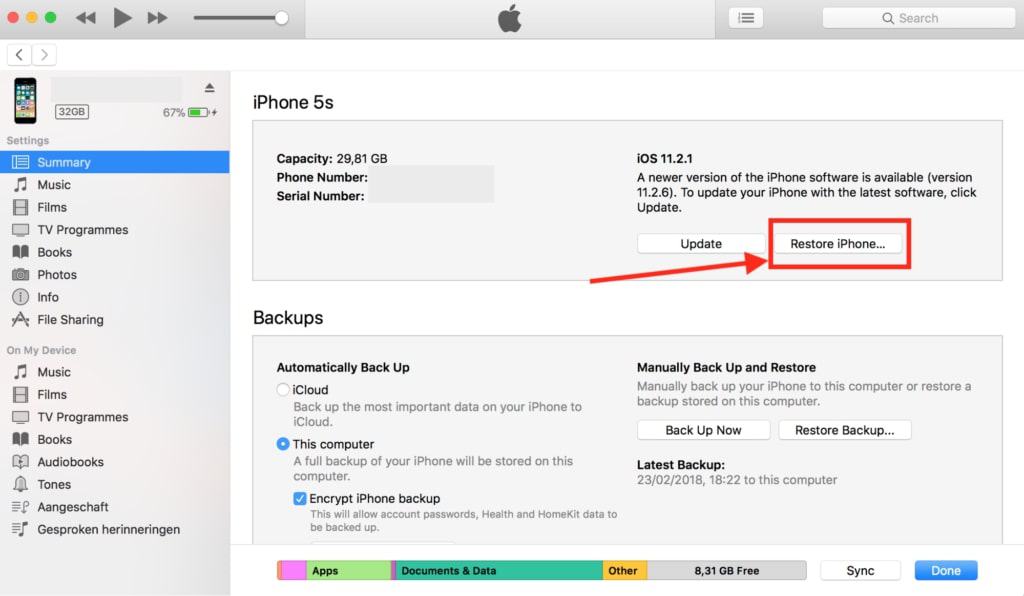
Did You Find Out That Someone Is Spying on You?
Generally, many people that fall victim to spy software are not even aware of the fact that it's happening.
Once you discover that someone has been spying on you, your first reaction may be disbelief (likely followed by anger). Whether it was with personal or business intent, the impact can be hard to cope with upon discovery.
If your cell phone is showing any of the signs listed above that suggest that someone might be spying or using a stalking app against you, I strongly recommend that you follow the above solutions for your Android or iOS device.
Perhaps it's not a spy software tool causing any of these signs, but it's always better to be safe than sorry!
If you are actually being stalked, in the U.S., I urge you to call the Stalking Resource Center at the National Center for Victims of Crime at 855-4-VICTIM (855-484-2846). If you are based in the U.K., call Paladin at 020 3866 4107.
How to Tell if Your Cell Phone is Being Tracked FAQ
Can Someone Read My WhatsApp Messages on My Cell Phone?
Sadly, yes. While it isn't possible on iOS devices, due to the operating system's sandboxing security, it is possible for apps to intercept your WhatsApp messages on Android devices. If you think this is happening, search for and uninstall the apps by following the instructions I discussed earlier in this article.
Can Someone Remotely Install Cell Phone Surveillance Software?
As a rule, it is extremely difficult for someone to remotely install phone surveillance software on an iPhone or Android smartphone without having physical access to the device. Some remote spying apps will allow you to track the location of an iPhone, but you'd require the user's iCloud login and password to enable the tracking of the device. Anything more than that and you'd require physical access.
Is There an App to See if Your Phone is Tapped?
There are no reliable apps that I am aware of that can detect if your phone is being tapped. However, there are apps for the Android platform that do have the capabilities of recording your calls and sending them back to the bad actors that created the app. To check for these apps, check the permissions for all of the installed apps on your device, following the steps I laid out above.
As for iPhone users, keep an eye on the indicator at the top of the screen to see if any app is using your microphone surreptitiously.
How Do I Block My Phone From Being Tracked?
To block your phone from being tracked, turn off the cellular and WiFi radios (turning on "Airplane Mode" does this). Disable your device's GPS radio or turn off "Location Services." On most Android devices, you can also shutdown the phone and remove the battery. It isn't possible to remove the battery from an iPhone. As you might be aware, doing any of the above will severely limit the use of your device. (Um, especially the part about turning it off.)
Can Someone Spy on You When Your Phone is Off?
Whistleblower Edward Snowden said in a 2014 interview that the NSA can listen in on your conversations using the microphone on your smartphone, even if the device is turned off. It does this by using spyware that prevents your smartphone from actually turning off.
The app makes it appear that your device is off, turning off the screen, ignoring incoming calls or button presses, but it is actually still on. Removing the battery from your device is the only way to be sure your device is actually powered down.
What Other Forms of Spyware Are There?
Spyware comes in various forms. These can include:
- Keyboard loggers that record your keystrokes you type on your device. This is handy for bad actors that want to glean your passwords, credit card numbers, and other important personal information.
- Adware that records a user's web activity and then uses the information to direct pop-ups and spam at users.
- Browser hijackers that reset your browser home page and other links. These allow the bad guys to redirect your traffic to malicious websites or to sites they make money from for directing traffic there. Browser hijackers can also be used to track your online habits.
- Modem hijackers take over your device's cellular or WiFi connection, making calls to 900 numbers and pay-for-play sites like porno sites, to place charges on your cellular bill.
How Can I Tell if Someone is Spying on My Phone?
If someone is spying on your phone, you may see your device's data usage increase, your phone may unexpectedly reboot or show signs of slowing down. You may also notice activity, such as your device's screen lighting up when it is in standby mode. You may also notice your device's battery life suddenly decreasing. These are just some of the indicators.
How To Find Spy Apps On Your Phone
Source: https://pixelprivacy.com/resources/spying-on-your-cell-phone/
Posted by: irvinhaster.blogspot.com

0 Response to "How To Find Spy Apps On Your Phone"
Post a Comment